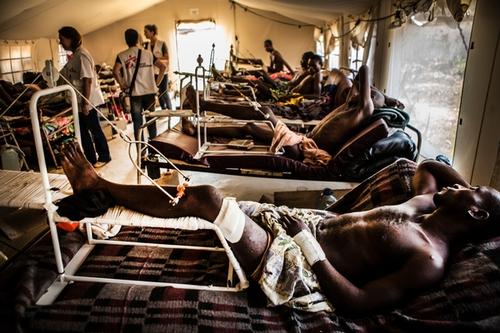Bangui, the capital of the Central African Republic, has been in the grip of violence for weeks but most of the city’s hospitals are no longer functioning. Médecins Sans Frontières (MSF) project coordinator Jessie Gaffric describes the situation. She is managing MSF's operations in the city’s only trauma unit, located in the Community Hospital. Since fighting began in Bangui on December 5, MSF teams have treated more than 800 patients there. Most have suffered bullet or knife wounds.
The Avenue des Martyrs, one of Bangui’s main arteries, is nearly deserted. It seems peaceful. It is difficult to imagine the violent skirmishes that occurred among armed groups at this very spot last night. The community hospital, the capital’s referral facility, is located in the area, not far from the stadium. The decrepit building houses the city’s only trauma unit, currently managed by MSF.
Hospital in chaos
“Last November, we had already identified a significant need for surgical care and had begun working on December 2,” Gaffric explains. “No one suspected then that the situation would explode three days later. That day, we received 120 wounded patients and another 60 the following day. We were submerged. We had to manage the situation under extremely difficult conditions. It was chaos. Because the hospital did not have enough room, we set up tents next to the building to house patients who needed post-operative care. Over time and as the emergency continued, we improved the patient pathway, management of the emergency department and the quality of care.”
Patients stream in every day
Since it opened, this unit has treated more than 800 wounded people, most of whom suffered bullet or knife wounds. On January 11, following the resignation of president Djotodia, we received more than fifty patients referred by other MSF health centres located in Bangui or in IDP camps in the town, at the Community Hospital. One man came by ambulance. He had been shot in the foot and tried to treat his injury himself. The infection was so severe that his foot had to be amputated. Another had had a motorcycle accident. A third had knife wounds. Patients stream in every day and every case is different. On average, 20 wounded people come to the hospital every day, with the flow peaking on certain days.
Staff sleep at the hospital
“Our primary challenges have to do with insecurity and time management, specifically because we must leave the hospital no later 6 p.m., when curfew begins,” Jessie says. “Nine expatriates and approximately 50 Central African staff work in this facility. Of those, some are living in the displaced persons’ camps. They cannot come to work when fighting occurs or must even stay and sleep in the hospital. What is also striking is the severity of the wounds, whether from a knife or machete. They attest to the level of violence and its relentlessness.”
MSF has managed both of the community hospital’s two operating rooms until now. The International Committee of the Red Cross (ICRC) recently took over one of them. Ultimately, the ICRC is expected to assume responsibility for the entire surgical department and MSF is preparing to work in another hospital in the city.



